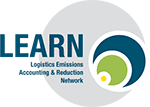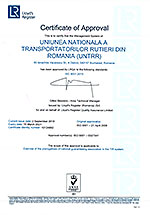Adresa UNTRR către Membrii Parlamentului European
Distinguished Member of the European Parliament,
The National Union of Road Hauliers from Romania (UNTRR), a professional, employers’, non-governmental organization of 16.000 members, kindly requests your consideration of several important implications of the document you are called to vote on the 8th of July - the Mobility Package.
While we are well aware that during the debates regarding the Mobility Package various concerns regarding its fairness, sustainability and impact have been discussed, we believe that in recent months we’ve all been through a momentous change with long term consequences which enabled us to think more from a perspective of collaborative learning experience.
Please take a moment to think about the new act as a mere roundabout with four exits – which one would you take?
As your choice will prevail upon us all, please consider the following:
- The Mobility Package, informed by considerations on social conditions and environment protection, aims to set a solid basis for largely accepted practices across the EU. In spite of this, you are asked to give your approval in the absence of a validated thorough impact assessment and in defiance of the principle of fairness. At a closer look, even the EU Treaties and EU Grean Deal are at stark contradiction with the new regulation you are about to vote.
The Mobility Package foresees an obligation for the truck to return home (country of registration) every eight weeks, irrespective of being loaded or empty. While this obligation would be easy to follow by a truck registered in Germany or France, according to our preliminary assessment (details here), for Romanian road transport industry the mandatory return home of the truck would result in an average of six lost days every eight weeks i.e. 10 to 14% business loss. Returning to Romania every eight weeks would mean an extra 1,000 trucks daily on European roads and at borders, without any valid economic justification. This could lead to additional 1,160 tons of CO2 emissions / day or 418,000 tons / year. Moreover, the risk to road safety would increase exponentially because of the additional traffic.
In addition, please consider how the impending Mobility Package relates to Article 91(2) of the Treaty on the Functioning of the European Union "TFEU" , stating that when common rules applicable to international transport are adopted, account shall be taken of cases where their application might seriously affect the standard of living and level of employment in certain regions, and the operation of transport facilities.
- How can we make sure that we are going to have a law that respects the right of drivers to choose the place where they want to spend their weekly rest?
The Mobility Package compels the companies to organize the return of the drivers in their home country every four weeks, while the fundamental freedoms of the EU state that the drivers shall be free to choose the destination/location for their free time.
If the Mobility Package is adopted, more than 60,000 drivers will have to return home every four weeks. This will require increasing the transport capacity and, according to estimations, this would mean up to 400 new flights or 1200 coaches or a mix between these two to carry 2,000 up to 3,000 drivers daily.
- During the restrictions brought about by the pandemic road hauliers have already been put under a huge strain. How are the new regulations going to help them coping with the increased costs?
The Mobility Package prohibits the regular weekly rest periods away from base to be taken in the vehicle. This interdiction comes at a time when there is a proven shortage of safe, properly equipped and secure parking areas on the main European road network, hence banning the rest in the cabin may even put drivers at risk. This is notably valid in the current circumstances (post COVID-19 pandemic long-term phase) in which sleeping in cabin would protect drivers’ health. Therefore, an obligation to take rest outside the cabin should only be imposed in connection with the availability of safe and secure parking places across the EU.
Posting rules application to road transport will increase the burden on road hauliers even more. The operators would have to calculate and pay different national wages for one driver per month, despite the fact that the European Commission launched infringement procedures against the minimum wage laws introduced during the recent years by certain Western EU Members States - like Loi Macron in France and MiloG in Germany (details here: https://europa.eu/rapid/press-release_IP-16-2101_en.htm)
- How is the new act going to steer clear of what might well be perceived as discriminatory practices in road transport?
Today, for the same transport operation performed in the Western EU, the Eastern hauliers are paid bellow 1 €/km, while Western ones are paid 1.5 €/km i.e. 50% more. Despite repeated requests addressed by UNTRR to the European Commission to investigate and analyse the significant differences between the tariffs for services provided on the same markets, at the same standards of quality, professionalism, reliability and predictability, nothing has happened.
Since the publication of the draft Mobility Package in 2017, UNTRR has asked the EU institutions to introduce therein the establishment of an European impartial mechanism, based on measurable criteria and data. Such a mechanism could be similar to the reference transport cost calculated by CNR in France (www.cnr.fr) in order to guarantee equal conditions for the provision of transport services. In European road transport the total cost of transport for clients should be composed of the reference cost plus a margin of each road transport company.
- How is the labor market going to react?
According to a report commissioned by the International Road Transport Union ( IRU report - 2019), the key cause of the worsening driver shortage is the public perception that working in the road transport industry is not attractive and this is particularly valid in Western countries like France, where 44% of the French respondents had a negative image of the sector. While Westerners are not attracted to work in road transport as it requires spending long periods of time alone and away from home, Easterners do their job and consider the cabin of the truck as their second home (as shown in the link on youtube).
The Mobility Package aims to stop this.
Unlike for road transport, the agriculture sector admitted quite a long time ago the need for seasonal workers and there was no debate about working conditions and wages. It is difficult to believe that nowadays, in agriculture, more nationals of developed EU countries would be attracted to harvest strawberries or asparagus, even if the workers were paid 5,000 €/month and the accommodation was insured. Not to mention the advantage of employers from those developed countries, who very often pay workers from Eastern Europe significantly less compared to their Western colleagues, despite working for the same company and doing the same job.
- How are both Western and Eastern Europe going to benefit from the new regulations regarding their road transport industry?
The future of Europe is already cloudy, despite the impression that some countries would be spared the storm if Mobility Package was adopted.
The vote you will be giving on 8th of July may result in thousands of bankruptcies among small trucking companies and the division of the European road transport operators into “first-hand” and “second-hand”, based on their nationality.
You still have the opportunity to contribute to a well-functioning road transport market, based on free competition. This is actually at stake and is now in your hands.
You are in the driver’s seat right now – and as things stand, you have the whole Europe in tow, depending on your YES or NO vote.
As we tried to pinpoint, YES would mean taking the exit backwards, to a fragmented, divided Europe. NO would actually mean a new chance to reconsider and drive things forward to a brighter, fairer future for all of us.
As J.W. Goethe puts it, conversation is the most important single thing in life.
It is the reason we have embarked upon writing this letter. And it is in the spirit of constructive dialogue that we remain available to cooperate with all those interested to make a decision founded on facts and realities of our times, to the benefit of all our countries.
With hope and consideration, your most dedicated partner in conversation
UNTRR


































